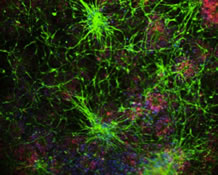Columbia University
Irving Medical Center
Neurological Institute
710 West 168th Street, 3rd floor
(212) 305-1818
Featured Research
In the Lab:
Miguel Arce RenterĂa, PhD

Miguel Arce RenterĂa, PhD
My research program investigates the sociocultural and environmental determinants of disparities in cognitive aging and Alzheimer’s disease and related dementias (ADRD), primarily among the Hispanic/Latino/Latinx communities (hereafter Latinx). My current research focus has been on determining factors of reserve and resilience to ADRD among Latinx adults, such as understanding the role of bilingualism. Leveraging my training as a clinical neuropsychologist, another extension of my research program has been to work with international studies of cognitive aging, leading efforts with the harmonization of cognitive data and development of diagnostic algorithms for the classification of mild cognitive impairment and dementia. As a bilingual and bicultural neuropsychologist who grew up in Mexico, issues of diversity are close to my heart. As such, I have dedicated my academic career to obtain the skills necessary to develop a research program to understand disparities in cognitive aging and ADRD, with the long-term goal to eventually improve the health and well-being of diverse individuals and communities.
The role of bilingualism in cognitive aging and ADRD remains unclear, and evidence of a bilingual advantage on cognition has been mixed. Bilingualism may contribute to both brain and cognitive reserve (Arce RenterĂa, M. et al., 2019), as bilinguals may retain similar levels of cognitive function in the face of AD-related neurodegeneration compared to monolinguals (Elliott, M., Arce RenterĂa, M. et al., 2021). However, important methodological differences in the bilingualism literature have produced inconsistent results across studies that limit our understanding of the role of bilingualism in cognitive aging. My approach to understanding the role of bilingualism in cognitive aging is to: 1) deconstruct bilingualism into its active components (i.e., age of acquisition, proficiency, frequency of language use, etc.) instead of treating bilinguals a monolithic group; 2) carefully account for potential sociocultural confounds in order to understand whether bilingualism truly has a direct effect on cognition or whether these relationships are due to environmental and sociocultural factors (e.g., educational experiences, socioeconomic status, and immigrant status) that influence ability or opportunity to become bilingual; and 3) incorporate diverse markers of neuropathology to evaluate if bilingualism modifies the association of neuropathology on cognitive and clinical outcomes. This work is currently ongoing.
My dedication to the field of bilingualism and cognitive aging has led to leadership opportunities, which has fostered additional collaborations with international investigators. First, in October of 2020, I formed the Bilingualism, Literacy and Languages Special Interest Group (BLL SIG), as part of the Diversity and Disparities Professional Interest Area (PIA) of the Alzheimer’s Association. I co-chair this BLL SIG with Dr. Suvarna Alladi, a neurologist based in Bangalore, India. In our monthly meetings, we discuss psychosocial and psycholinguistic issues associated with the assessment of bilingualism in the context of cognitive aging. The BLL SIG meetings include around 30 to 40 attendees on average from across the globe. These meetings provide critical information regarding the state of the field from diverse perspectives, from a linguistically and geographically diverse group of multidisciplinary scientists. Lastly, I was invited by the NIA to consult on the planning of an NIA-sponsored workshop on bilingualism and cognitive reserve and resilience. This workshop was held on March 2021, in which I presented my work and was an active panelist throughout the course of the workshop. Our efforts throughout the two-day workshop directly influenced the development of the RFA-AG-23-001 “Understanding the Role of Bilingualism in Cognitive Reserve/Resilience in Aging and AD/ADRD (R01 Clinical Trial Optional),” which was announced on October 2021.
Although the causes of ADRD disparities among Latinx in the US are likely multifactorial, cross-national research offers a unique opportunity to understand the social, economic, and cultural factors associated with cognitive risk and resilience across Latinx individuals residing in the US and in low-and middle-income countries (LMICs). The Harmonized Cognitive Assessment Protocol (HCAP) through the Health and Retirement Study (HRS) offers a flexible but comparable instrument for measuring cognitive function among older adults around the world through the HRS’ sister studies, such as the Mexican Health and Aging Study (MHAS) Ancillary Study on Cognitive Aging in Mexico (Mex-Cog). Within Mex-Cog, I operationalized diagnostic criteria for mild cognitive impairment (MCI) and its subtypes using an actuarial neuropsychological approach (Arce RenterĂa, M. et al., 2021). MCI diagnosis was assigned based on a comprehensive cognitive assessment assessing the domains of memory, executive functioning, language, and visuospatial ability. A critical aspect of the neuropsychological approach was the careful selection of a normative sample by means of the robust norms approach. Through this work, we were able to establish that the prevalence of amnestic MCI was 5.9%. Furthermore, we were able to evaluate mid-life and late-life sociodemographic and health factors that may increase risk of MCI and we found that older age, depression, low education, rurality, and midlife hypertension and diabetes were associated with higher risk of late-life MCI among older adults in Mexico. Furthermore, working with these international studies, I have developed with my colleagues Dr. Emily Briceño from the University of Michigan and Dr. Alden Gross from Johns Hopkins University, a cultural neuropsychological approach to statistical harmonization of cognitive data (Briceño, E., Arce RenterĂa, M. et al., 2022). The next stage of this work involves validation of the harmonized cognitive factor scores and evaluate change in cognitive status.
Overall, my work leverages ongoing studies of cognitive aging both within the United States (i.e., the Washington Heights Inwood Columbia Aging Project [WHICAP], the Offspring Study, and the REasons for Geographic and Racial Differences in Stroke [REGARDS] study), and internationally (i.e., Mexican Health and Aging Study [MHAS], Longitudinal Aging Study in India Diagnostic Assessment of Dementia [LASI-DAD] and others associated with the Harmonized Cognitive Assessment Protocol (HCAP) Network) to better understand the sociocultural factors associated with cognitive risk and resilience across Latinx individuals residing in the US and abroad.
Related publications can be found at the NIH Library of Medicine website.
Miguel Arce RenterĂa, PhD
Assistant Professor of Neuropsychology (in Neurology and in the Gertrude H. Sergievsky Center)
ma3347@cumc.columbia.edu

